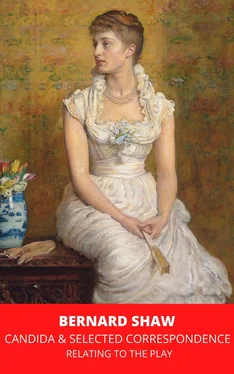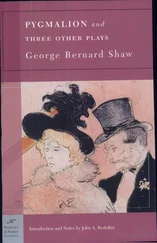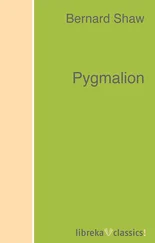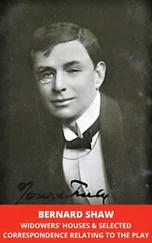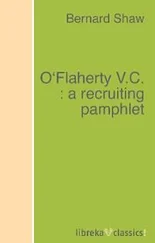You cannot read “ Candida ”: you know very well that you have been strictly ordered not to read until your eyes are better. Wild horses shall not tear that script from me, especially after your atrocious conduct in being at the Lyceum [Theatre] that Saturday and not coming in. There was no danger of your kissing me: no woman, however audacious & abandoned, would dare take such a liberty with a man of my majestic presence. I liked Henry [Irving], though he is without exception absolutely the stupidest man I ever met—simply no brains—nothing but character & temperament. Curious, how little use mere brains are: I have a very fine set; and yet I learnt more from the first stupid woman who fell in love with me than ever they taught me.
I won’t WONT, WONT, WONT, WONT, WONT, WON’T let you read “Candida.” I must read it to you, if I have to do it through the keyhole. But I, too, fear to break the spell: remorses, presentiments, all sorts of tendernesses wring my heart at the thought of materialising this beautiful friendship of ours by a meeting. You were quite right not to come in on Saturday: all would have been lost. In some lonely place, by starlight—stop: I am getting idiotic. Miss Terry: your servant!
GBS
36/ Ellen Terry to Bernard Shaw
2nd October 1896
. . . I couldnt come in. All of a sudden it came to me that under the funny circumstances I should not be responsible for my impulses. When I saw you, I might have thrown my arms round your neck and hugged you! I might have been struck shy. The Lord knows what I might or might not have done, and I think H. I. [Henry Irving]might not have seen the joke! (He thinks me crazy, but “good.” It’s t’other way on!)
Would not you like to be somebody’s (anybody’s perhaps!) pleasure for a few moments? Well, you have been my sole delight for the last six weeks, and I’m ever gratefully yours. By the way though, you dont play fair. Your “ Saturday ” [ Review article] was perfect, all but about E. T. You scolded her in private beautifully, but you should first have printed your letter to her. You know perfectly well that in the acting of this “Womanly woman” I’m pretty bad, and you might have said so in The Saturday plain and straight.
Yes. [My son] Ed’ard Gordon Craig can act, or will act. He had best be quick for he is a big boy for 7 and that’s his age.
Ah, let him act in something of yours. Heavens! He’s better than that other acty boy. Now when I’m clear of “velvet” friends who are flocking around me, I’m going to get to know the Strange Lady and to make acquaintance with a beautiful new tricycle I have, and to—oh! do ever so many nice things, when I’m less exhausted.
Arent you going to send me Candida ? Only to read. I wont steal it, but I want to know her. Now there’s no need for you to write to me any more.
Oh aint it a dark day.
Good-bye
[Ellen Terry]
37/ To Ellen Terry
5th October 1896
I am at my wits’ end—telegrams every five minutes asking for articles about Morris [died on the 3rd October], and a million other worries. Last night I had to orate at Hornsey [Socialist Society]; and a young lady got up afterwards and said, “I don’t think what I have to ask belongs to the subject of the lecture; but will Mr Shaw tell us when his play will be produced at the Lyceum ?“
Happy Morris ! he is resting .
You remember the publication of [Clement] Scott’s criticisms of the Lyceum the other day. Well, I reviewed it: that was all. Not worth reading—dead and gone journalism.
When I read your remark about Peer Gynt, I fainted away stone dead. In Heaven’s name, how old is E.G.C. [Edward Gordon Craig]? What puts such audacious ideas into his infant head? If you’re serious, he must be either much too good or much too bad for me. I expect it will end in my having to teach him his alphabet.
I have just been asked to stay at Radlet from Saturday to Monday—for the 25th. What am I to do—read you “ Candida ”?—or did you say Radlet, or am I dreaming?
Oh, I can’t write, I can’t think, I am beaten, tired, wrecked. I should like to get away from this wretched place to some corner of heaven, and be rocked to sleep by you.
What did you say about Morris?—do you want an article about him? Look in the [ Daily ] Chronicle tomorrow, and ask me no more questions: my brain won’t work. I haven’t energy even to tear this letter up.
GBS
38/ To Ellen Terry
12th October 1896
. . . And now as to all my love affairs. One [Florence Farr] is just perishing under a bad attack of the Wandering Jew. Then there is my lady [Charlotte Payne-Townshend from the 1st June 1898 Mrs Bernard Shaw] with the light green eyes and the million of money, whom I have got to like so much that it would be superfluous to fall in love with her. Then there is Janet [Achurch], who, on hearing of the Irish rival, first demanded, with her husband [Charles Charrington] to witness my testimony, whether I still loved her, and then, on receiving the necessary assurance, relented and informed me that she had been faithless to me (with the said husband) to the extent of making “Candida” impossible until after next February, when she expects to become once more a mother. And then there are others whom I cannot recollect just at present, or whom you don’t know anything about. And finally there is Ellen, to whom I vow that I will try hard not to spoil my high regard, my worthy respect, my deep tenderness, by any of those philandering follies which make me so ridiculous, so troublesome, so vulgar with women. I swear it. Only, do as you have hitherto done with so wise an instinct: keep out of my reach. You see, nobody can write exactly as I write: my letters will always be a little bit original; but personally I shouldn’t be a bit original. All men are alike with a woman whom they admire. You must have been admired so much and so often—must know the symptoms so frightfully well. But now that I come to think of it, so have I. Up to the time I was 29, actually twentynine, I was too shabby for any woman to tolerate me. I stalked about in a decaying green coat, cuffs trimmed with the scissors, terrible boots, & so on. Then I got a job to do & bought a suit of clothes with the proceeds. A lady [Mrs Jane “Jenny” Patterson] immediately invited me to tea, threw her arms round me, and said she adored me. I permitted her to adore, being intensely curious on the subject. Never having regarded myself as an attractive man, I was surprised; but I kept up appearances successfully. Since that time, whenever I have been left alone in a room with a female, she has invariably thrown her arms round me and declared she adored sae. It is fate. Therefore beware. If you allow yourself to be left alone with me for a single moment, you will certainly throw your arms round me and declare you adore me; and I am not prepared to guarantee that my usual melancholy forbearance will be available in your case.
But I am really getting idiotic. All this time I have been trying to recollect something—oh, to be sure. The photographs! I return them with many thanks. The young man is excellent—good chin, good mouth, not too long upper lip, good brow, and plenty of head above his ears. . . .
If he [Ellen Terry’s son Gordon Craig] has a nimble tongue, he will make a good actor or a good anything else: perhaps he ought to be something else. There is not suffering enough in his face for the hero of “ Candida ”; but he might act that. Is the young lady [your daughter] Ailsa [Edith] Craig? I don’t recognise her, though I saw Ailsa in Pinero’s play [ Bygones ] & remember her very well. I shall finish this letter by instalments in the course of the week. By the way, what place did you say? Was it Radlett?
Читать дальше
